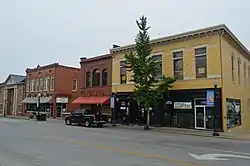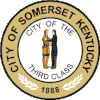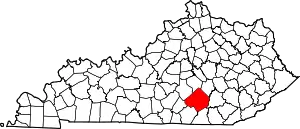Somerset, Kentucky
Somerset is a home rule-class city in Pulaski County, Kentucky, United States. The city population was 11,924 according to the 2020 census. It is the seat of Pulaski County.
Somerset, Kentucky | |
|---|---|
 Corner of Main Street and West Mt. Vernon Street, featuring the historic Goldenburg Furniture building | |
 Seal | |
| Motto: Welcome Home | |
 Location of Somerset in Pulaski County, Kentucky. | |
| Coordinates: 37°05′04″N 84°36′29″W | |
| Country | United States |
| State | Kentucky |
| County | Pulaski |
| Government | |
| • Mayor | Alan Keck |
| Area | |
| • Total | 14.09 sq mi (36.48 km2) |
| • Land | 14.07 sq mi (36.44 km2) |
| • Water | 0.02 sq mi (0.05 km2) |
| Elevation | 860 ft (260 m) |
| Population (2020) | |
| • Total | 11,924 |
| • Estimate (2022)[3] | 12,218 |
| • Density | 847.60/sq mi (327.26/km2) |
| Time zone | UTC-5 (Eastern (EST)) |
| • Summer (DST) | UTC-4 (EDT) |
| ZIP codes | 42501-42503 |
| Area code | 606 |
| FIPS code | 21-71688 |
| GNIS feature ID | 2405483[2] |
| Website | http://www.cityofsomerset.com/ |
History
Somerset was first settled in 1798 by Thomas Hansford and received its name from Somerset County, New Jersey, where some of the early settlers had formerly lived. Somerset became the Pulaski County seat in 1801, and was incorporated as a city in 1887. A Civil War battle was fought in January 1862 at Mill Springs (now "Nancy") about 8 miles (13 km) west of Somerset, and a museum is at the site. A smaller battle was fought nearby at Dutton's Hill in 1863. In 1875 tracks for the Southern Railway were completed and Somerset saw a population growth and an increase in industry.[4] In the late 1930s and early 1940s, library services were provided by the pack horse library.[5][6] The completion of Lake Cumberland in 1950 transformed Somerset from a sleepy rural community into a recreation center.
The Center for Rural Development in Somerset was established in 1996. It is a 501c(3) nonprofit organization that describes its mission as follows: "to provide leadership that stimulates innovative and sustainable economic development solutions and a better way of life for the citizens we serve."[7][8] The center's programs and services focus on public safety, arts & culture, leadership, and technology.[7]
Geography
The city is located at the eastern end of Kentucky's Mississippian Plateau (or Pennyroyal Plateau); however, the micropolitan area extends eastward into the Appalachian Plateau (or Eastern Kentucky Coalfield), and northward to Kentucky's Outer Bluegrass region. Thus, the area shows variations in landforms and scenery.
Nearby Lake Cumberland is one of the largest man-made lakes in the world (101 miles in length, with an average depth of 85 feet (26 m) and a normal pool containing more than 2 trillion gallons of water). Somerset is also near Cumberland Falls and the Big South Fork National River and Recreation Area; its tourism industries are, in part, due to its scenic and varied landscape.[9]
According to the United States Census Bureau, the city has a total area of 11.3 square miles (29 km2), of which 11.3 square miles (29 km2) is land and 0.09% is water.
Climate
The climate in this area is characterized by hot, humid summers and generally mild to cool winters. According to the Köppen Climate Classification system, Somerset has a humid subtropical climate, abbreviated "Cfa" on climate maps.[10]
Somerset's climate is warm during summer when temperatures tend to be in the 80s and mild during winter when temperatures tend to be in the 30s and 40s. The warmest month of the year is July with an average daily maximum temperature of 86 °F (30 °C). The coldest month of the year is January with an average minimum temperature of 25.10 °F (−3.83 °C).
The annual average precipitation at Somerset is 51.08 inches (1,297 mm). Rainfall is fairly evenly distributed throughout the year. The wettest month of the year is May with an average rainfall of 5.17 inches (131 mm). Snowfall typically occurs between the months of December and February, though on record as early as October and as late as May.
Demographics
| Census | Pop. | Note | %± |
|---|---|---|---|
| 1830 | 231 | — | |
| 1850 | 412 | — | |
| 1860 | 662 | 60.7% | |
| 1870 | 587 | −11.3% | |
| 1880 | 805 | 37.1% | |
| 1890 | 2,625 | 226.1% | |
| 1900 | 3,384 | 28.9% | |
| 1910 | 4,491 | 32.7% | |
| 1920 | 4,072 | −9.3% | |
| 1930 | 5,508 | 35.3% | |
| 1940 | 6,154 | 11.7% | |
| 1950 | 7,097 | 15.3% | |
| 1960 | 7,112 | 0.2% | |
| 1970 | 10,436 | 46.7% | |
| 1980 | 10,649 | 2.0% | |
| 1990 | 10,733 | 0.8% | |
| 2000 | 11,352 | 5.8% | |
| 2010 | 11,196 | −1.4% | |
| 2020 | 11,924 | 6.5% | |
| 2022 (est.) | 12,218 | [11] | 2.5% |
| U.S. Decennial Census[12] | |||
The major demographic differences between the city and the micropolitan area relate to income, housing composition and age. The micropolitan area, as compared to the incorporated city, is more suburban in flavor and has a younger housing stock, a higher income, and contains most of the area's school age population. Over the last 20 years, housing growth has occurred along the Fishing Creek tributary of Lake Cumberland, which lies just to the west of the City of Somerset, and along the main body of Lake Cumberland between the City of Burnside and Fishing Creek. Much of the Somerset area housing growth in the last 20 years is lake-oriented.
As of the census[13] of 2000, there were 11,352 people, 4,831 households, and 2,845 families residing within the City of Somerset (proper). The population density for the city proper was 1,007.1 persons per square mile (388.8 persons/km2). A karst valley occupies the south-central portion of the city, taking up about 25% of the land area; this valley is quasi-industrialized and also contains parks and recreational facilities; most of the population lies to the east and north of this valley in fairly compact residential neighborhoods that have a real population density of about 1,800 persons per square mile. There were 5,428 housing units at an average density of 481.5 per square mile (185.9/km2). The racial makeup of the city was 94.16% White, 3.66% Black, 0.18% Native American, 0.71% Asian, 0.26% from other races, and 1.02% from two or more races. Hispanic or Latino of any race were 0.99% of the population.
There were 4,831 households, out of which 26.6% had children under the age of 18 living with them, 41.3% were married couples living together, 15.0% had a female householder with no husband present, and 41.1% were non-families. 37.8% of all households were made up of individuals, 18.4% had someone living alone who was 65 years of age or older. The average household size was 2.13 and the average family size was 2.80.
In the city proper, 20.6% were under the age of 18, 8.5% were in the age cohort from 18 to 24, 27.8% from 25 to 44, 21.7% from 45 to 64, and 21.4% who were 65 years of age or older. The median age was 40 years. For every 100 females, there were 82.5 males. For every 100 females age 18 and over, there were 78.5 males.
The median income for a household in the city was $22,362, and the median income for a family was $31,226. Males had a median income of $28,536 versus $20,194 for females. The per capita income for the city was $14,048. About 16.4% of families and 22.1% of the population were below the poverty line, including 31.3% of those under age 18 and 18.9% of those age 65 or over.
Economy
Tourism is important to Somerset, due to its proximity to Lake Cumberland. Lake Cumberland generated approximately $150 million in revenue each year as of 2013, though the industry has been greatly impacted in recent years by the U.S. Army Corps of Engineers' work on the Wolf Creek Dam.[14] Since 2007, Lake Cumberland has been at low levels to facilitate the Corps work.[15] The city holds the annual Master Musicians Festival. The Civil War Battle of Mill Springs took place in nearby Nancy. In November 2006, the Mill Springs Battlefield Visitor Center and Museum opened. Begun in 2001, Somernites Cruise is a monthly classic car show held the fourth weekend of the months April through October.
In 2006, a new 58-acre (230,000 m2) medical park, called MedPark West, was finished near the Lake Cumberland Regional Hospital (LCRH). LCRH is one of the largest in the state. LCRH is a JCAHO-accredited hospital with 304 beds. A virtual online tour of the hospital is available.[16] A ventilator care facility, Rockcastle Regional Hospital and Respiratory Care Center, is in adjoining Rockcastle County.
On June 26, 2012, Somerset city voters approved the sale of alcoholic beverages by a margin of 2,167 "Wet" votes to 1,464 "Dry" votes. This vote allows for packaged liquor and beer sales, and sales by the drink at restaurants and bars.[17]
In 2014, a municipal-run filling station, the Somerset Fuel Center, was opened in response to persistently high local gas prices. "The price of gas will be based on an average regional price and will include a small markup to cover costs, the mayor said."[18] In addition to serving local residents, it was hoped the station would encourage visits to nearby Lake Cumberland for fishing and boating.[18]
Nearby Somerset, located off Highway 461, is the Valley Oak Technology Complex, an industrial center. Housed there are such companies as SafeAuto.
Employers
Major employers in the Somerset area include:[19]
Education
There are schools in the county, served by two main school systems – Somerset Independent and Pulaski County. Students living within the city limits typically fall under the Somerset Independent school district. The Pulaski County School System contains Pulaski County High School (PCHS) and Southwestern High School (SWHS), which was built in 1993 to alleviate overcrowding.
There are other smaller schools, including Tabernacle Christian Academy, Science Hill Independent, Somerset Christian School, and Saline Christian Academy. The three main high schools are Southwestern, Pulaski County, and Somerset. There is a local two-year college, Somerset Community College, part of the Kentucky Community and Technical College System (KCTCS). Somerset Community College offers one of the few Aviation Maintenance Technology programs (Airframe and Powerplant) in Kentucky.
Somerset has a lending library, a branch of the Pulaski County Public Library.[20]
Notable people
- James L. Allen – one of the founders of the management consulting firms Booz Allen Hamilton and Strategy
- Harriette Simpson Arnow – author
- Howard H. Baker – U.S. congressman for the state of Tennessee
- John Sherman Cooper – former U.S. senator, liberal Republican, and member of the Warren Commission
- Jack Daws – artist
- Daniel Dutton – artist, lyricist, and composer[21]
- Bud Foster – former Virginia Tech Hokies football defensive coordinator
- Lance Fuller – actor
- Vermont Garrison – U.S. Air Force pilot in three wars who achieved "ace" status in both World War II and Korean War
- Jack I. Gregory – General, USAF, Commander in Chief Pacific Air Forces 1986–1988
- Reggie Hanson – former NBA player for the Boston Celtics
- Chuck Hardwick – politician and businessman, served as Speaker of the New Jersey General Assembly
- Lewis G. Longsworth – chemist, biochemist, recipient of the 1968 American Chemical Society Award in Chromatography and Electrophoresis
- Ted McCarty – electrical engineer known for his innovations and design work at the Gibson Guitar Corporation
- Monte Montague – stage and film actor
- Edwin P. Morrow – Governor of Kentucky, 1919–1923
- Tunstall Quarles – pioneer settler of Somerset, lawyer, state representative, state senator. Organized first bank in Somerset
- Lloyd B. Ramsey, (1918–2016), Major General United States Army, Commander 23rd Infantry Division (United States) (1969–1970)
- Venus Ramey – Miss America 1944
- Red Roberts – American football player and coach
- Tommy Lee Wallace – film producer, director, and screenwriter
References
- "2020 U.S. Gazetteer Files". United States Census Bureau. Retrieved March 18, 2022.
- U.S. Geological Survey Geographic Names Information System: Somerset, Kentucky
- "Annual Estimates of the Resident Population for Incorporated Places in Kentucky: April 1, 2020 to July 1, 2022". United States Census Bureau. Retrieved May 26, 2023.
- "Fact Sheet - somersetpulaskichamber". somersetpulaskichamber.com. December 17, 2020.
- "Pack-Horse Library Planned in Pulaski". The Courier-Journal. October 25, 1936. Retrieved September 3, 2017 – via Newspapers.com.
- "WPA Library at Somerset Unique". The Advocate-Messenger. May 4, 1939. Retrieved September 3, 2017 – via Newspapers.com.
- "About". Center for Rural Development.
- Reighard, Angela (December 12, 2016). "The Center for Rural Development celebrates its 20th anniversary". WYMT.
- "Find a County". National Association of Counties. Retrieved June 7, 2011.
- "Somerset, Kentucky Köppen Climate Classification (Weatherbase)". Weatherbase.
- "Annual Estimates of the Resident Population for Incorporated Places in Kentucky: April 1, 2020 to July 1, 2022". United States Census Bureau. Retrieved May 26, 2023.
- "Census of Population and Housing". Census.gov. Retrieved June 4, 2015.
- "U.S. Census website". United States Census Bureau. Retrieved January 31, 2008.
- Estep, Bill. "With water level higher, optimism rises around Lake Cumberland". Lexington Herald-Leader. Retrieved March 5, 2015.
- The Governor's Interagency Services Office for the Lake Cumberland Region 2007-2008 Report Archived 2008-04-10 at the Wayback Machine. Retrieved on 2008-04-06.
- Lake Cumberland Regional Hospital (LCRH) Archived 2009-06-10 at the Wayback Machine official site
- "Somerset gearing up for alcohol education". Commonwealth Journal.
- Schreiner, Bruce (July 18, 2014). "Kentucky town opens retail filling station, is criticized as promoting socialism". The Washington Post. Retrieved July 24, 2014.
- Somerset-Pulaski County Community Profile
- "Kentucky Public Library Directory". Kentucky Department for Libraries and Archives. Archived from the original on January 11, 2019. Retrieved June 7, 2019.
- Nance, Kevin (December 11, 1994). "Somerset Man Tries Another Ambitious Work; Daniel Dutton Now Writing 4-Part Opera". Lexington Herald-Leader. p. H1.
Daniel Dutton is back. The self-taught composer-writer-painter from Somerset is best known for The Stone Man, an uncategorizeable musical stage work produced by the Kentucky Opera in Louisville that toured throughout the state five years ago.
